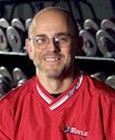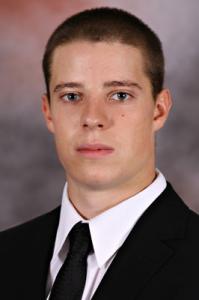| Notice: High-speed Internet (500 kbps) is required to view video feeds without interruption. All fans can still use the audio-only feeds. |
2008-09 Postseason Broadcasts
| Saturday, March 14, 2009 | |||||||||
| NCAA Quarterfinals | |||||||||
| Boston College | 3 | at | Minnesota | 4 | |||||
| Guest Analysts: Laura Halldorson (Princeton ’85), Ali Brewer (Brown ’00) | |||||||||
| Boston College Interview: Katie King | |||||||||
| Minnesota Interview: Brad Frost | |||||||||
| Sunday, March 15, 2009 | |||||||||
| CWHL Semifinals | |||||||||
| Missisauga | 4 | at | Brampton | 1 | |||||
| Guest Analyst: Kim McCullough (Dartmouth ’02) | |||||||||
| Mississauga Interview: Jennifer Botterill | |||||||||
| Brampton Interview: Kathleen Kauth | |||||||||
| Thursday, March 19, 2009 | |||||||||
| CWHL/WWHL Semifinals | |||||||||
| Minnesota | 4 | vs. | Montreal | 3 | (OT) | ||||
| Calgary | 3 | vs. | Brampton | 4 | |||||
| Guest Analysts: Kim McCullough (Dartmouth ’02), Angela Ruggiero (Harvard ’04), Sami Jo Small | |||||||||
| WWHL Interviews: Carla MacLeod, Winny Brodt | |||||||||
| CWHL Interviews: Jayna Hefford | |||||||||
| Friday, March 20, 2009 | |||||||||
| DI NCAA Semifinals | |||||||||
| Minnesota-Duluth | 1 | vs. | Wisconsin | 5 | |||||
| Mercyhurst | 5 | vs. | Minnesota | 4 | |||||
| Guest Analysts: A.J. Mleczko (Harvard ’99), Laura Halldorson (Princeton ’85) | |||||||||
| Minnesota-Duluth Interviews: Shannon Miller, Johanna Ellison | |||||||||
| Wisconsin Interviews: Mark Johnson, Jessie Vetter | |||||||||
| Mercyhurst Interviews: Mike Sisti, Meghan Agosta | |||||||||
| Minnesota Interviews: Brad Frost, Gigi Marvin | |||||||||
| Sunday, March 22, 2009 | |||||||||
| D1 NCAA Championship | |||||||||
| Mercyhurst | 0 | vs. | Wisconsin | 5 | |||||
| Guest Analysts: A.J. Mleczko (Harvard ’99), Laura Halldorson (Princeton ’85) | |||||||||
| Mercyhurst Interview: Mike Sisti | |||||||||
| Wisconsin Interview: Mark Johnson | |||||||||
2008-09 Regular Season Broadcasts
\
| Friday, October 3, 2008 | |||||||||
| NCAA Non-Conference | |||||||||
| Ohio State | 2 | at | Providence | 1 | |||||
| Guest Analyst: Digit Murphy (Cornell ’83) | |||||||||
| Ohio State Interviews: Jackie Barto, Hayley Klassen | |||||||||
| Providence Interviews: Bob Deraney, Erin Normore | |||||||||
| Saturday, October 4, 2008 | |||||||||
| CWHL | |||||||||
| Mississauga | 1 | at | Brampton | 2 | |||||
| Guest Analyst: TBA | |||||||||
| Mississauga Interviews: Sami Jo Small (Stanford ’98) | |||||||||
| Brampton Interviews: Bobbi-Jo Slusar (Wisconsin ’07) | |||||||||
| Sunday, October 19, 2008 | |||||||||
| CWHL | |||||||||
| Brampton | 3 | at | Burlington | 4 | |||||
| Guest Analyst: TBA | |||||||||
| Brampton Interview: Ashley Pendleton (Mercyhurst ’07) | |||||||||
| Burlington Interview: Sara Bauer (Wisconsin ’07) | |||||||||
| Saturday, October 25, 2008 | |||||||||
| Hockey East | |||||||||
| Boston College | 3 | at | Providence | 1 | |||||
| Guest Analyst: TBA | |||||||||
| Boston College Interviews: Katie King, Maggie Taverna | |||||||||
| Providence Interviews: Bob Deraney, Katy Beach | |||||||||
| Friday, November 14, 2008 | |||||||||
| WWHL | |||||||||
| Edmonton | 1 | at | Minnesota | 2 | |||||
| Guest Analyst: TBA | |||||||||
| Minnesota Interviews: Angela Ruggiero | |||||||||
| Sunday, November 16, 2008 | |||||||||
| NCAA Non-Conference | |||||||||
| Connecticut | 0 | at | Providence | 2 | |||||
| Guest Analyst: TBA | |||||||||
| Connecticut Interviews: Heather Linstand, Dominique Thibault | |||||||||
| Providence Interviews: Brittany Simpson | |||||||||
| Friday, November 21, 2008 | |||||||||
| NCAA Non-Conference | |||||||||
| Wisconsin | 8 | vs. | New Hampshire | 2 | |||||
| Guest Analyst: | |||||||||
| Wisconsin Interviews: Mark Johnson, Erika Lawler | |||||||||
| New Hampshire Interviews: Brian McCloskey, Kacey Bellamy | |||||||||
| Saturday, November 22, 2008 | |||||||||
| NCAA Non-Conference | |||||||||
| Wisconsin | 2 | vs. | New Hampshire | 0 | |||||
| Guest Analyst: | |||||||||
| Wisconsin Interviews: Kyla Sanders | |||||||||
| New Hampshire Interviews: Sam Faber | |||||||||
| Friday, November 28, 2008 | |||||||||
| NCAA Non-Conference | |||||||||
| Harvard | 1 | at | Minnesota | 3 | |||||
| Guest Analyst:Laura Halldorson (Princeton ’85) | |||||||||
| Harvard Interviews: Katey Stone | |||||||||
| Minnesota Interviews: Brad Frost | |||||||||
| Saturday, November 29, 2008 | |||||||||
| NCAA Non-Conference | |||||||||
| Harvard | 2 | at | Minnesota | 3 | |||||
| Guest Analyst: Caitlin Cahow (Harvard ’08), Erica McKenzie (Minnesota ’08) | |||||||||
| Harvard Interviews: Sarah Vaillancourt | |||||||||
| Minnesota Interviews: Rachael Drazan | |||||||||
| Friday, December 5, 2008 | |||||||||
| WWHL | |||||||||
| Calgary | 9 | at | Minnesota | 2 | |||||
| Guest Analyst: | |||||||||
| Calgary Interview: Rebecca Russell | |||||||||
| Minnesota Interview: Julie Chu | |||||||||
| Sunday, December 7, 2008 | |||||||||
| WWHL | |||||||||
| Calgary | 3 | at | Minnesota | 4 | (SO) | ||||
| Guest Analyst: | |||||||||
| Calgary Interview: Gina Kingsbury | |||||||||
| Minnesota Interview: | |||||||||
| Saturday, December 13, 2008 | |||||||||
| CWHL | |||||||||
| Brampton | 6 | at | Vaughan | 0 | |||||
| Guest Analyst: | |||||||||
| Brampton Interview: | |||||||||
| Vaughan Interview: Martine Garland | |||||||||
| Sunday, December 14, 2008 | |||||||||
| CWHL | |||||||||
| CWHL All-Stars | 10 | vs. | NHL Alumni | 10 | |||||
| Guest Analyst: Kim McCullough (Dartmouth ’02) | |||||||||
| CWHL Interviews: | |||||||||
| NHL Interviews: Mark Napier (Executive Director, NHL Alumni Association | |||||||||
| Saturday, January 3, 2008 | |||||||||
| Division III | |||||||||
| Elmira | 4 | at | Middlebury | 5 | (OT) | ||||
| Guest Analyst: | |||||||||
| Elmira Interviews: Greg Fargo, Kayla Coady | |||||||||
| Middlebury Interviews: Bill Mandigo, Randi Dumont | |||||||||
| Saturday, January 10, 2009 | |||||||||
| CWHL | |||||||||
| Montreal | 4 | at | Vaughan | 3 | |||||
|
Guest Analyst: |
|||||||||
| Montreal Interviews: Annie Guay | |||||||||
| Vaughan Interviews: Samantha Shirley | |||||||||
| Sunday, January 11, 2009 | |||||||||
| CWHL | |||||||||
| Montreal | 3 | at | Mississauga | 4 | (SO) | ||||
| Guest Analyst: Bobbi Jo Slusar (Wisconsin ’07) | |||||||||
| Montreal Interviews: Kim St. Pierre | |||||||||
| Mississauga Interviews: Lara Perks | |||||||||
| Friday, January 16, 2009 | |||||||||
| Division III | |||||||||
| Plattsburgh | 3 | at | Amherst | 1 | |||||
| Guest Analyst: | |||||||||
| Plattsburgh Interviews: Kevin Houle | |||||||||
| Amherst Interviews: Jim Plumer | |||||||||
| Saturday, January 17, 2009 | |||||||||
| Division III | |||||||||
| St. Thomas | 0 | at | Gustavus Adolphus | 1 | |||||
| Guest Analyst: | |||||||||
| St. Thomas Interviews: Tom Palkowski | |||||||||
| Gustavus Adolphus Interviews: Mike Carroll | |||||||||
| Saturday, January 24, 2009 | |||||||||
| WCHA | |||||||||
| Minnesota-Duluth | 3 | at | Minnesota | 4 | (SO) | ||||
| Guest Analysts: Laura Halldorson (Princeton ’85), Ali Brewer (Brown ’00) | |||||||||
| Minnesota-Duluth Interviews: Shannon Miller, Sara O’Toole | |||||||||
| Minnesota Interviews: Brad Frost, Melanie Gagnon | |||||||||
| Saturday, January 31, 2009 | |||||||||
| CWHL | |||||||||
| Mississauga | 2 | vs. | Brampton | 3 | |||||
| Guest Analyst: | |||||||||
| Mississauga Interviews: Ashley Stephenson | |||||||||
| Brampton Interviews: Mandy Cronin | |||||||||
| Saturday, February 7, 2009 | |||||||||
| WCHA | |||||||||
| Wisconsin | 2 | at | Minnesota | 4 | |||||
| Guest Analyst: | |||||||||
| Wisconsin Interviews: Mark Johnson, Angie Keseley | |||||||||
| Minnesota Interviews: Brad Frost, Brittany Francis | |||||||||
| Saturday, February 14, 2009 | |||||||||
| Division III | |||||||||
| Manhattanville | 0 | at | Plattsburgh | 6 | |||||
| Guest Analyst: | |||||||||
| Manhattanville Interviews: Eric Lang, Alex Blackwell | |||||||||
| Plattsburgh Interviews: Kevin Houle, Danielle Blanchard | |||||||||
| Friday, February 20, 2009 | |||||||||
| ECAC | |||||||||
| Clarkson | 4 | at | Dartmouth | 4 | (OT) | ||||
| Guest Analysts: | |||||||||
| Clarkson Interviews: Shannon Derosiers, Kimberly McKenney | |||||||||
| Dartmouth Interviews: Mark Hudak | |||||||||
| Saturday, February 21, 2009 | |||||||||
| ECAC | |||||||||
| St. Lawrence | 4 | at | Dartmouth | 3 | |||||
| Guest Analysts: | |||||||||
| St. Lawrence Interviews: Chris Wells, Carson Duggan | |||||||||
| Dartmouth Interviews: Shannon Bowman | |||||||||
| Saturday, February 28, 2009 | |||||||||
| CWHL | |||||||||
| Burlington | 3 | at | Brampton | 7 | |||||
|
Guest Analyst: |
|||||||||
| Burlington Interviews: Lindsay Vine | |||||||||
| Brampton Interviews: Gillian Apps | |||||||||

